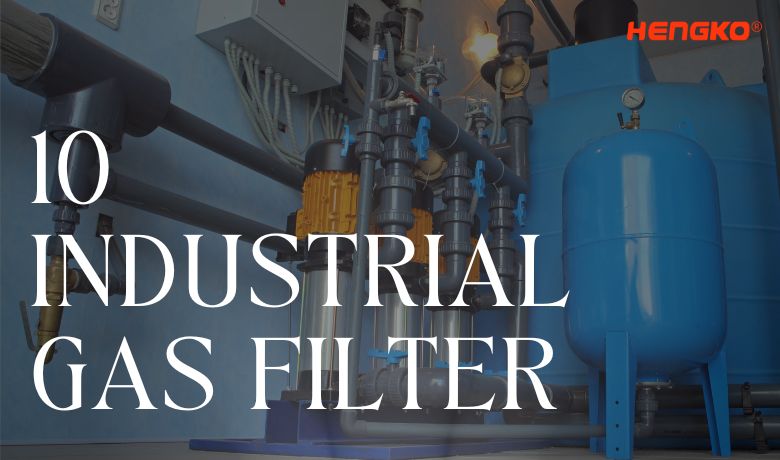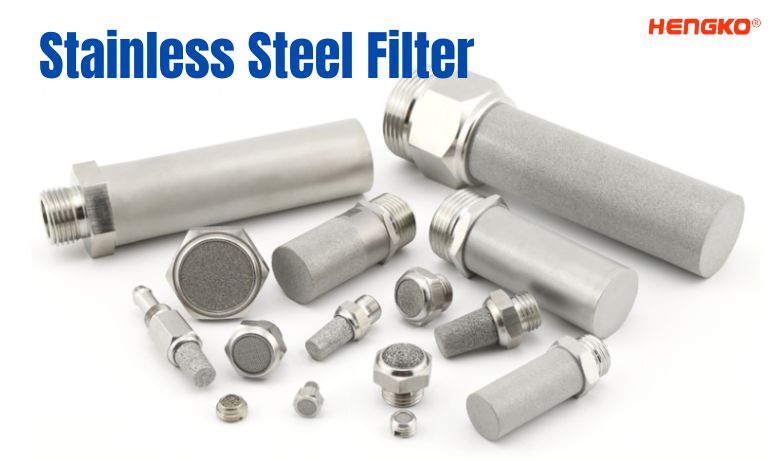
Gas filtration is the unsung hero of many industrial processes. It removes impurities and contaminants from gases, ensuring:
* Safety: Protects workers from harmful substances and prevents explosions.
* Equipment longevity: Keeps machinery free from damaging particles, minimizing downtime and maintenance costs.
* Product quality: Ensures clean gas streams for high-purity products.
As following, we list some important and popular filter technical for Industrial Gas Filter System.
Hope those will be helpful for your decision and choose.
1. High-Efficiency Particulate Air (HEPA) Filters: Champions of Air Purification
HEPA filters are the workhorses of air filtration, renowned for their ability to capture a wide range of airborne contaminants.
Filtration Efficiency:
HEPA filters are certified to capture at least 99.97% of airborne particles as small as 0.3 microns in diameter. This impressive efficiency makes them ideal for trapping dust, pollen, mold spores, smoke, bacteria, and even some viruses.
Applications:
* Cleanrooms: Essential for maintaining a sterile environment in critical applications like pharmaceutical manufacturing and electronics assembly.
* HVAC Systems: Incorporated into air purifiers and hospital ventilation systems to improve indoor air quality.
* Laboratories: Used to protect researchers and ensure the integrity of experiments by minimizing airborne contaminants.
Advantages:
*Highly Efficient:
HEPA filters offer exceptional filtration efficiency, removing a significant portion of harmful airborne particles.
*Reliable Performance:
They function effectively in various environments, from residential homes to industrial facilities.
*Readily Available:
HEPA filters are widely available in various sizes to fit most air purifiers and HVAC systems.
HEPA filters play a crucial role in safeguarding air quality and protecting human health across a diverse range of applications.
2. Ultra-Low Penetration Air (ULPA) Filters: Taking Air Cleanliness to the Extreme
ULPA filters are the HEPA filter’s even more meticulous cousin, offering the ultimate level of air purification for applications demanding the cleanest possible air.
Comparison with HEPA Filters:
Filtration Efficiency: ULPA filters surpass HEPA by capturing a minimum of 99.9995% of airborne particles as small as 0.1 microns in diameter. This means they capture even tinier particles, including viruses, bacteria, and certain nanoparticles.
Think of it like this:
* HEPA filters are like a fine-mesh net, catching most airborne debris.
* ULPA filters are like an even tighter mesh, designed to capture the tiniest particles that slip through a HEPA filter.
Applications:
* Semiconductor Manufacturing:
Preventing microscopic dust particles from settling on delicate electronic components is vital for ensuring chip functionality.
* Pharmaceuticals:
Maintaining a sterile environment is paramount for drug production and research. ULPA filters help eliminate airborne contaminants
that could compromise product quality or safety.
Advantages:
*Superior Filtration:
ULPA filters offer unparalleled filtration efficiency, capturing the most minute particles that could pose a risk in sensitive environments.
*Ensures Sterility:
By removing virtually all airborne contaminants, ULPA filters create a near-sterile environment, minimizing the risk of contamination in critical applications.
However, there are some trade-offs:
*Higher Cost:
Compared to HEPA filters, ULPA filters are generally more expensive due to their denser media and stricter manufacturing requirements.
*Lower Airflow:
The denser media of ULPA filters can restrict airflow to some extent.
This may require adjustments to the ventilation system to maintain adequate air circulation.
Overall, ULPA filters are the go-to solution for industries requiring the absolute cleanest air possible.
While they come with a slightly higher price tag and airflow consideration, the benefits in terms of superior filtration and sterility enhancement are invaluable in specific applications.
3. Electrostatic Precipitators (ESPs)
Description: ESPs use electrical charges to attract and remove fine particles from gas streams. They ionize particles, making them stick to collector plates for easy removal.
Applications:
Common in power plants (removing fly ash from flue gas) and cement factories (capturing dust emissions).
Advantages:
Highly effective for fine particle removal, with the added benefit of being energy-efficient.
4. Activated Carbon Filters
Description:
These filters use a special carbon media with a large surface area to trap gases, odors, and volatile organic compounds (VOCs) through a process called adsorption.
Applications:
Air purification systems, industrial odor control (e.g., chemical processing plants, wastewater treatment facilities), and respirator cartridges.
Advantages:
Versatile for removing a wide range of gaseous contaminants, making them valuable across various industries.
5. Ceramic Filters
Description:
Made from heat-resistant ceramic materials, these filters can withstand high temperatures, making them ideal for hot gas streams.
They often employ a filtration mechanism similar to traditional depth filters.
Applications:
Industrial processes involving high-temperature gases, such as in the steel, glass, and cement industries.
Advantages:
Invaluable in high-temperature environments, offering durability and long service life.

6. Sintered Metal Filters (Including Sintered Stainless Steel)
Importance in Industrial Gas Filtration:
Sintered metal filters, often made from sintered stainless steel, play a crucial role in industrial gas filtration thanks
to their unique combination of properties.
They offer a strong, permanent filtering media suitable for harsh environments.
Techniques:
Sintered metal filters find application in various gas filtration processes:
*Catalyst Recovery:
In chemical processing, they capture and retain valuable catalysts from gas streams. This improves process efficiency by minimizing catalyst loss and reducing the need for frequent replacements.
*High-Temperature Gas Filtration:
Their high-temperature resistance makes them ideal for flue gas cleaning in power plants and hot gas filtration in various industrial processes. The ability to withstand extreme temperatures allows them to handle harsh gas streams effectively.
*Gas Purification:
Sintered metal filter are used to remove particulates from natural gas, ensuring its purity before it enters pipelines or undergoes further processing. This protects downstream equipment from damage and maintains the overall quality of the gas.
Benefits:
Here’s why sintered metal filters are a valuable choice:
*High-Temperature Resistance:
They can withstand extreme temperatures, making them suitable for hot gas streams.
*Corrosion Resistance:
Sintered stainless steel offers excellent resistance to corrosion, allowing them to function effectively in harsh chemical environments.
*Durability and Long Service Life:
Their strong metal structure makes them durable and long-lasting, minimizing replacement needs and reducing maintenance costs.
*Efficient Filtration:
Sintered metal filters offer effective filtration of particles down to submicron sizes, ensuring clean gas streams.
*Regenerative Cleaning:
Many sintered metal filters can be backwashed or cleaned with solvents, allowing for reusability and extending their lifespan.
Overall, sintered metal filters offer a robust and reliable solution for a wide range of industrial gas filtration applications, contributing to efficient and safe operations across various industries.
Video Link: https://www.youtube.com/embed/QrxzA_0seCA
7. Depth Filters: Trapping Contaminants Throughout the Layers
Depth filters, unlike their surface filtration counterparts, offer a multi-layered approach to gas filtration.
Description:
These filters consist of a thick, porous media, typically made from cellulose, fiberglass, or synthetic fibers. The media is layered, with finer layers towards the center and coarser layers on the outside. As gas flows through the filter, contaminants get trapped throughout the depth of the media based on their size. Larger particles get caught in the outer layers, while finer ones penetrate deeper, eventually getting trapped in the tighter inner layers.
Applications:
*Chemical Processing:
Removing catalyst fines and other particulates from process streams.
*Pneumatic Systems:
Protecting sensitive equipment from dust and debris in compressed air lines.
*Food and Beverage:
Pre-filtration in bottling and processing lines to remove contaminants.
*Power Generation:
Filtration of air intake for gas turbines and other equipment.
Advantages:
*High Dirt-Holding Capacity:
Due to their multi-layered structure, depth filters can hold a significant amount of contaminants without clogging.
*Longer Service Life:
The ability to capture particles throughout the depth of the media prolongs the filter’s lifespan compared to surface filters.
*Cost-Effective:
Depth filters provide effective filtration at a lower cost per unit compared to some other types of filters.
*Flexibility:
Available in various configurations and media types to suit different filtration requirements and flow rates.
Depth filters offer versatility and efficiency in gas filtration applications where high dirt-holding capacity and longer service intervals are beneficial.
8. Bag Filters: Bulk Filtration for High-Volume Gas Streams
Bag filters, also known as fabric filters, are commonly used for high-volume gas filtration. They are effective at capturing a wide range of particle sizes, making them suitable for various industrial applications.
Description:
*Bag filters consist of long, cylindrical bags made from woven or felted fabric. These bags are housed in a frame or casing.
*As gas flows through the bag, particles are captured on the surface and within the fabric’s fibers.
*Periodic cleaning methods, such as shaking, pulsing with compressed air, or reverse airflow, remove the accumulated particles from the bags.
Applications:
*Cement Plants:
Capturing dust and particulates from kiln exhaust gases.
*Power Plants:
Removing fly ash from flue gas emissions.
*Steel Mills:
Filtering dust and fumes from various manufacturing processes.
*Chemical Industry:
Controlling emissions and recovering valuable product dust.
Advantages:
*High Efficiency:
Bag filters can capture particles down to submicron sizes, making them highly effective for industrial gas filtration.
*Large Filtration Area:
The cylindrical shape of the bags provides a large surface area for filtration, allowing for high gas flow rates.
*Versatile:
Suitable for a wide range of applications due to their ability to handle different particle sizes and gas compositions.
*Easy Maintenance:
The cleaning mechanisms ensure that the filter bags maintain their efficiency over time, reducing downtime and maintenance costs.
Bag filters are a reliable and cost-effective solution for industries that require high-volume gas filtration, ensuring compliance with environmental regulations and protecting equipment from particulate contamination.
9. Fiber Bed Mist Eliminators: Capturing Mist and Fine Droplets
Fiber bed mist eliminators, also known as fiber bed coalescers, are designed to remove mist, fine droplets, and aerosols from gas streams. They are particularly useful in applications where liquid carryover needs to be minimized.
Description:
*These filters consist of densely packed fibers, usually made from glass, polypropylene, or other synthetic materials, arranged in a cylindrical or flat panel configuration.
*As gas flows through the fiber bed, droplets and mist particles collide with the fibers, coalesce, and form larger droplets that are eventually drained away.
Applications:
*Chemical Processing: Removing acid mist from scrubber exhaust gases.
*Oil Refineries: Capturing oil mist from vacuum pump exhausts.
*Pharmaceutical Manufacturing: Controlling solvent emissions from drying and coating processes.
*Metalworking: Filtering coolant mist from machining operations.
Advantages:
*High Efficiency:
Fiber bed mist eliminators can capture very fine droplets and aerosols, ensuring clean gas output.
*Reduced Emissions:
By effectively removing mist and droplets, these filters help industries comply with stringent environmental regulations.
*Long Service Life:
The dense fiber arrangement provides a large surface area for mist capture, leading to extended filter life and reduced maintenance.
*Low Pressure Drop:
Despite their high efficiency, fiber bed mist eliminators maintain a low pressure drop, ensuring efficient gas flow and minimizing energy consumption.
Fiber bed mist eliminators are essential for industries that need to control liquid carryover in gas streams, providing effective mist capture and enhancing process efficiency and environmental compliance.
10. Conclusion
Understanding and selecting the right filtration technology is crucial for ensuring efficient and effective gas filtration in industrial applications.
Each type of filter offers unique advantages and is suited for specific use cases, from capturing fine particulates to removing mist and aerosols.
By leveraging the appropriate filtration solutions, industries can enhance process performance, protect equipment, and meet environmental standards.
Video Link: https://www.youtube.com/embed/QrxzA_0seCA
As industrial processes evolve, so do the demands for efficient and reliable gas filtration technologies.
Evaluating your current filtration systems and considering upgrades to advanced technologies can significantly enhance operational efficiency and safety.
For the best solutions and ideas tailored to your specific industrial gas filter applications, contact HENGKO by email at [email protected]
Media Contact
Company Name: HENGKO
Contact Person: Media Relations
Email: Send Email
Phone: 0086-755-88823250
Country: China
Website: https://www.hengko.com/